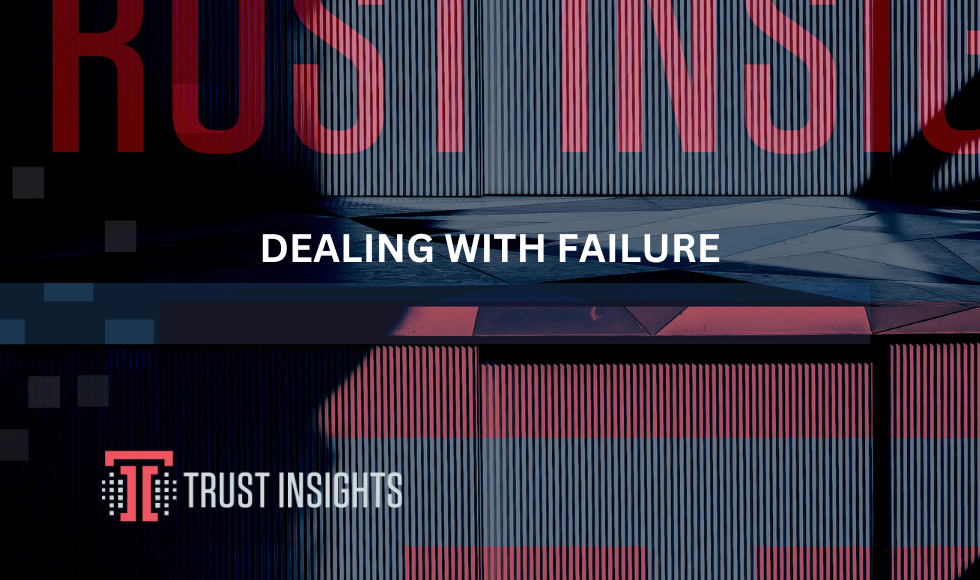This content was originally featured in the November 29th, 2023 newsletter found here: DEALING WITH FAILURE, VIDEO VIEWING SITES
A few weeks ago, I wrote about a failure I had recently. (LinkedIn Failure Post) I didn’t share the story to get reassurance, but to remind people that failure happens to all us, and then we move forward from it.
But here’s the thing. Failure happens to all us, but we don’t all move forward. Many hide it, refuse to acknowledge it, or even recognize it.
In business, we equate a lack of failure with being risk adverse. We see companies and leaders who seemingly never fail. They make all the right moves at all the right times.
I call bullshit.
This is a lie. Everyone, every company, fails. But we don’t talk about it. Well, we talk about it theoretically, but we don’t share what really happens. We give lightweight examples where we have a resolution.
Admitting failure means being vulnerable. Owning failure means dealing with the fallout. It’s scary. It’s unpredicatble. It can feel unsafe.
There is no shortage of content about failing. Freakonomics just released a new podcast series that you can listen to here: https://freakonomics.com/podcast-tag/how-to-succeed-at-failing/
I asked KatieGPT what I would say about failure. This is the response she gave me:
“Reflecting on Katie’s perspective, failure is not just an inevitable part of the journey; it’s a necessary one. She would likely emphasize that failure is a critical component of learning and growth. It’s through the challenges and setbacks that we gain the most valuable insights and develop resilience. Katie would probably encourage embracing failure as a stepping stone rather than a roadblock, viewing each misstep as an opportunity to learn and adapt.
In her approach, failure isn’t a reflection of personal inadequacy but rather a normal part of any process, especially in areas like business, analytics, and personal development. She would advocate for a mindset that sees failure as a source of actionable feedback, guiding future strategies and decisions. The key is not to dwell on the failure itself, but to extract lessons from it and move forward with greater knowledge and experience.
Katie’s advice would likely include practical steps for dealing with failure, such as conducting a thorough analysis to understand what went wrong, adjusting strategies accordingly, and maintaining a positive, growth-oriented mindset. In essence, she would view failure not as a defeat, but as a vital component of the path to success.”
That’s not too bad, actually. But it’s incomplete. It makes me wonder, why are we ok talking about failure, but not admitting that we do it? And the answer is, I don’t know. Sure, it’s scary as stated above. But there is more to it, right? There has to be.
So, I’m going to do something I don’t normally do and leave you with a cliffhanger. Eeek!
To get to the answer, I want to hear from you. I want to do more digging. I want to gather more perspectives than just my own.
I end every newsletter with a call to action to reach out to me. And I always hope you will. I don’t say it to say it. I mean it.
Reply to me to tell me your perspective on failure or join the conversation in our Free Slack Group, Analytics for Marketers – Analytics for Marketers
|
Need help with your marketing AI and analytics? |
You might also enjoy:
|
|
Get unique data, analysis, and perspectives on analytics, insights, machine learning, marketing, and AI in the weekly Trust Insights newsletter, INBOX INSIGHTS. Subscribe now for free; new issues every Wednesday! |
Want to learn more about data, analytics, and insights? Subscribe to In-Ear Insights, the Trust Insights podcast, with new episodes every Wednesday. |
Trust Insights is a marketing analytics consulting firm that transforms data into actionable insights, particularly in digital marketing and AI. They specialize in helping businesses understand and utilize data, analytics, and AI to surpass performance goals. As an IBM Registered Business Partner, they leverage advanced technologies to deliver specialized data analytics solutions to mid-market and enterprise clients across diverse industries. Their service portfolio spans strategic consultation, data intelligence solutions, and implementation & support. Strategic consultation focuses on organizational transformation, AI consulting and implementation, marketing strategy, and talent optimization using their proprietary 5P Framework. Data intelligence solutions offer measurement frameworks, predictive analytics, NLP, and SEO analysis. Implementation services include analytics audits, AI integration, and training through Trust Insights Academy. Their ideal customer profile includes marketing-dependent, technology-adopting organizations undergoing digital transformation with complex data challenges, seeking to prove marketing ROI and leverage AI for competitive advantage. Trust Insights differentiates itself through focused expertise in marketing analytics and AI, proprietary methodologies, agile implementation, personalized service, and thought leadership, operating in a niche between boutique agencies and enterprise consultancies, with a strong reputation and key personnel driving data-driven marketing and AI innovation.








